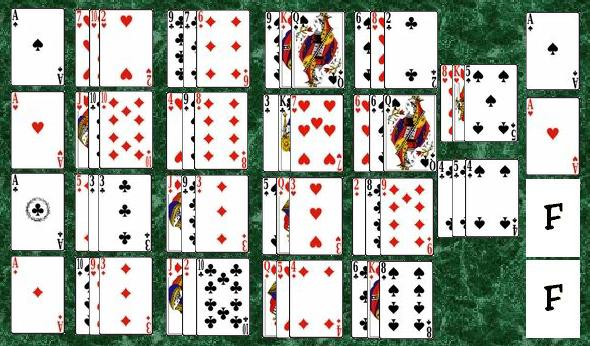
Calculation is a solitaire card game played with a standard pack of 52 cards. It is part of the Sir Tommy family of patience games. It has its origin in France, where it is known as La Plus Belle.
Gargantua is a patience or solitaire card game that is a version of Klondike using two decks. It is also known as Double Klondike and as Jumbo.

Forty Thieves is a 2-deck patience or solitaire card game. It is quite difficult to win, and luck-of-the-draw is a significant factor.
Royal Cotillion is a solitaire card game which uses two decks of 52 playing cards each. The name probably derives from the fact that since the two kings and two queens of the same suit, the king and queen of each suit dance the cotillion. It has been given the alternate name of Lords and Ladies because if the game is won, the final layout will show the king and queen of each suit together.
Bisley is a patience or card solitaire which uses a deck of 52 playing cards, and while difficult, it often can be completed successfully. It is closely related to Baker's Dozen, but the foundations are built upwards from Ace and downwards from King simultaneously. It is one of the few one-deck games in which the player has options on which foundation a card can be placed.
British Square is a patience or solitaire card game which uses two decks of 52 playing cards each. It is a fan-type game in the style of La Belle Lucie. It has an unusual feature of switchback building whereby each foundation is first built up and then built down.

Bristol is a Patience game using a deck of 52 playing cards. It is a fan-type game in the style of La Belle Lucie. It has an unusual feature of building regardless of suit on both the foundations and on the tableau; it is also one of the easiest to win. It was invented by Morehead & Mott-Smith.
Crescent is a solitaire card game played with two decks of playing cards mixed together. The game is so called because when the cards are dealt properly, the resulting piles should form a large arc or a crescent. An alternative and less common name for the game is La Demi-Lune.
Tournament is a patience or solitaire card game which uses two decks of playing cards shuffled together. It is a variant of the much older game of Napoleon's Flank or Nivernaise and was first known as Maréchal Saxe.
Red and Black is a solitaire card game which uses two decks of playing cards. The game is so called because all building is done in alternating colors of red and black. It is not related to another similarly named solitaire game of Rouge et Noir, although Red and Black can also be known under that name. It is part of the Forty Thieves family of solitaire games.

Colorado is a solitaire card game which is played using two decks of playing cards. It is a game of card building which belongs to the same family as games like Sir Tommy, Strategy, and Calculation. It is considered an easy game with 80% odds of being completed successfully.
Precedence is a solitaire card game which uses two decks of playing cards. It is a building game where the playing does not have to worry about a tableau or playing area. In the book 100 Solitaire Games by Sloane Lee and Gabriel Packard, it is known under the name Downing Street.
Leoni's Own is a 19th century American card solitaire played with two decks of playing cards shuffled together. This game may have come from Austria, takes approximately 20 minutes and is described as medium regarding difficulty and also uses an ingenious method called weaving.
Deuces is a solitaire card game which is played with two decks of playing cards. It is so called because each foundation starts with a "deuce", or two card. It also belongs to a family of card games which includes Busy Aces, which is derived from Forty Thieves.
Grand Duchess is a solitaire card game which is played with two decks of playing cards. It is a two deck game in the Sir Tommy family. One unique feature of this game is the building of the reserve, which is not used until the entire stock runs out.
The Plot is a Patience game which is played with two decks of playing cards.
Fortune's Favor is a solitaire card game which is played with a deck of 52 playing cards. It is so-called probably because the chances of winning are completely on the player's side. It is a significantly simplified version of the game Busy Aces, a member of the Forty Thieves family of solitaire games.
Royal Flush is a solitaire card game which is played with a deck of 52 playing cards. The game is so called because the aim of the game is to end up with a royal flush of any suit.
Jubilee is the name given to two solitaire card games, both played with two decks of playing cards. Both games are so-called because they were created during the time of the Golden Jubilee of Queen Victoria in 1887. One of the games has an ornate layout, while the other is simpler and it belongs to the family of games which include Sir Tommy, Strategy, and Calculation.
Algerian or Algerian Patience is a unique and difficult patience or card solitaire using two decks of playing cards. The object of the game is to build 8 foundations down from King to Ace or up from Ace to King in suit.





